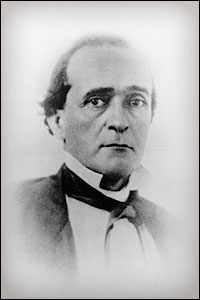Harris Flanagin facts for kids
Quick facts for kids
Harris Flanagin
|
|
|---|---|
 |
|
| 7th Governor of Arkansas | |
| In office November 15, 1862 – April 18, 1864 In exile April 18, 1864 – May 26, 1865 |
|
| Preceded by | Thomas Fletcher (acting) |
| Succeeded by | Isaac Murphy |
| Member of the Arkansas Senate from Ouachita and Clark counties |
|
| In office November 6, 1848 – November 4, 1850 |
|
| Preceded by | B. W. Pearce |
| Succeeded by | Constituency abolished |
| Member of the Arkansas House of Representatives from Clark County |
|
| In office November 7, 1842 – November 4, 1844 Serving with Joshua D. Stewart
|
|
| Preceded by | Simeon Buckner Archibald H. Rutherford |
| Succeeded by | Joseph Gray William Owens |
| Personal details | |
| Born | November 3, 1817 Roadstown, New Jersey, U.S. |
| Died | October 23, 1874 (aged 56) Arkadelphia, Arkansas, U.S. |
| Resting place | Rose Hill Cemetery, Arkadelphia, Arkansas, U.S. 34°7′8.3″N 93°3′42.6″W / 34.118972°N 93.061833°W |
| Political party | Democratic (from 1856) |
| Other political affiliations |
Whig (until 1856) |
| Spouse |
Martha Eliza Flanagin
(m. 1851) |
| Children | 3 |
| Military service | |
| Allegiance | |
| Branch/service | |
| Years of service | 1861–1862 |
| Rank | |
| Commands | 2d Arkansas Mounted Rifles |
| Battles/wars | American Civil War |
Harris Flanagin (born November 3, 1817 – died October 23, 1874) was an American politician and lawyer. He served as the 7th governor of Arkansas from 1862 to 1864. During the American Civil War, he was also an officer in the Confederate States Army. He led soldiers in important battles.
Early Life and Education
Harris Flanagin was born in Roadstown, New Jersey. His father, James, was a farmer and cabinetmaker. His mother was Mary Harris. Harris went to a Quaker school in New Jersey. After school, he became a teacher at Clermont Seminary in Frankford, which is now part of Philadelphia.
Later, Flanagin moved to Illinois. He continued teaching there and also studied law. In 1838, he moved to Arkansas. He lived in a few different towns before settling in Arkadelphia, Arkansas in 1842.
Flanagin began his political career in Arkansas. He served in the Arkansas House of Representatives from 1842 to 1844. Then, he was a member of the Arkansas Senate from 1848 to 1850. On July 3, 1851, he married Martha Eliza Nash. When the American Civil War started, Flanagin joined the army. He became a colonel and led the 2nd Arkansas Mounted Rifles.
Governor of Arkansas
In 1862, Harris Flanagin was elected governor of Arkansas. He left the army to take on this new role. His time as governor was very challenging because of the ongoing Civil War. He had to deal with many war-related problems.
The government faced shortages of important goods. Prices for things were going up. They also had to help families of soldiers who had been hurt or killed. The state government could not collect taxes during the war. Instead, they paid for the war using special paper "war bonds."
On September 10, 1863, Union forces took over Little Rock, Arkansas, the state capital. Governor Flanagin quickly gathered as many government papers as he could. He then moved the capital to Washington, Arkansas. This meant his government was "in exile" because it was not in the official capital.
While Flanagin's government stayed in Confederate-controlled southwest Arkansas, another government was set up. A Union governor, Isaac Murphy, took office in Little Rock on April 18, 1864. This meant Arkansas had two governments at the same time during the war.
Later Life and Death
After the American Civil War ended, Harris Flanagin returned the state's important documents. He went back to working as a lawyer in Arkadelphia. He passed away on October 23, 1874. He is buried at Rose Hill Cemetery in Arkadelphia.
 | Delilah Pierce |
 | Gordon Parks |
 | Augusta Savage |
 | Charles Ethan Porter |

